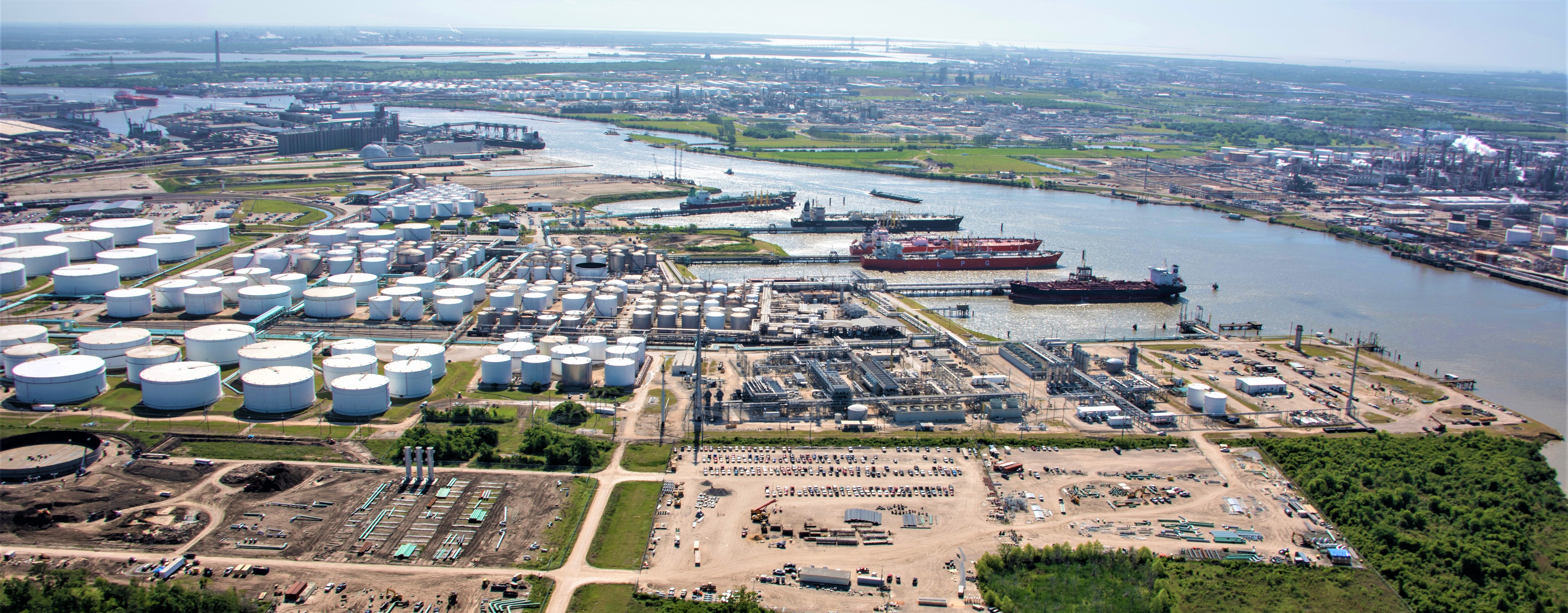January Commerce Club Featuring Anthony Chovanec, Senior Vice President, Enterprise Products

Photo courtesy of Enterprise Products Partners
Petrochemical Exports Promise Positive Future for Port Region
 The Greater Houston Port Bureau hosted a virtual Commerce Club webinar event on January 13, featuring Anthony Chovanec, senior vice president of fundamentals and commodity risk assessment for Enterprise Products Partners, as speaker. Presented in a predominantly Q & A discussion-style format, Chovanec focused his thoughts on the factors impacting the future for Houston’s port region.
The Greater Houston Port Bureau hosted a virtual Commerce Club webinar event on January 13, featuring Anthony Chovanec, senior vice president of fundamentals and commodity risk assessment for Enterprise Products Partners, as speaker. Presented in a predominantly Q & A discussion-style format, Chovanec focused his thoughts on the factors impacting the future for Houston’s port region.
Crude Oil Production Forecast
Chovanec presented forecasted crude oil production numbers reflective of the three-year period of 2021, 2022, and 2023. Charts reflected forecasts by OPEC, the U.S. Energy Information Administration (“EIA”), and the Enterprise team, that includes geoscientists, geologists, petroleum engineers, and geophysicist. Their forecast projects 4.8 million barrels per day of crude oil production.
“4.8 million barrels a day is a healthy number,” said Chovanec. “Oil almost always has associated rich natural gas with it as NGLs. It just so happens that most of this product is going to be coming out of the Permian Basin, which is oil rich, and particularly on the Delaware side, natural gas rich. When we look at the NGL supply scenario, that 1.7 to 1.8 million barrels is likely to have somewhere around greater than 600,000 barrels of natural gas liquids in it, and that ethane and propane is exported from the Houston Ship Channel.
Scenarios presented a high case of $55 and a low case of $45.
Looking at the rate of return for oil drilling in the U.S., Chovanec explained that the repercussions of the pandemic prompted “soul-searching for all oil-producing nations” and brought a “retooling” to the industry. “We’re not after growth anymore,” explained Chovanec. “We’re after positive cash flows.”
The $45 low case in the forecast showed a completion return to 67% of pre-COVID levels in the Permian and Eagle Ford plays, with other plays returning to approximately 50%. “Growth is always going to be in Permian Basin,” Chovanec said. “It doesn’t mean others won’t produce … but the world class basin in the United States is the Permian Basin.”
Less Aggressive Drilling
“We’ve had a sea change in the sentiment of producers and, more importantly, we’ve had a sea change in the capital markets that support them, whether that be equity markets, debt markets, and even private markets,” stated Chovanec as he discussed the less aggressive approach to drilling.
Chovanec said that formerly leases were purchased but never drilled, a type of growth that didn’t necessarily produce profit in bottom-lines for cash. “Investors want profit and cash-flow positive,” he said.
Currently, motor gasoline is at 9 million barrels a day, within approximately 500,000 barrels a day of 2019 averages. Deisel is currently about 4 million barrels a day, within a “couple hundred thousand” a day of 2019 levels. The flagging commodity is jet fuel. Chovanec attributes this to shorter flights, with domestic-only flights keeping airports busy, but slow international travel. The same trends are seen globally.
Impact of New Energy Products to the Port Region
Using data from EIA’s 2020 World Energy Outlook, Chovanec discussed global energy consumption by fuel. GDP per person in non-OECD (“Organisation [sic] for Economic Co-operation & Development”) countries is expected to triple by 2050, with a projected 88% of the next one billion entrants to the middle class to come from Asia. Energy-intensive manufacturing is expected to continue to shift to non-OECD Asia, increasingly to India. In the last decade, 60% of oil demand growth was driven by transportation, but 60% of future growth is projected to be driven by petrochemicals.
“When I think of the United States, and Houston being the ‘energy capital of world’ – there is no doubt that is how the world sees us and that is what we are – and that is going to be the case for renewables,” said Chovanec. “. . . We’ve proven the Gulf Coast is energy capital of the world for petrochemicals. There’s not a replacement for these molecules, and there’s tremendous demand for them.”
Discussing exports, Chovanec explained the U.S. has taken the market. As demand slows domestically, demand will accelerate globally, benefiting exports. For example, data shows that Mexico is substantially dependent on the U.S. for gasoline. “Gulf Coast refiners will continue to be more and more gasoline exporters to the world, largely to the Atlantic Basin,” he emphasized.
Energy Evolution
Enterprise looks at energy transition as “energy evolution”. Approximately a year ago, the company initiated an evolutionary technology team. The group examines technologies and evaluates “what and how” the technologies apply to them. Chovanec believes the company will be in the businesses of hydrogen, carbon capture, and plastic recycling.
“Our view is that the world needs them all,” stressed Chovanec as he discussed current and future energy products. “If you following what is going on in Europe, it is proving the world needs them all. If you don’t have them all, it causes significant economic and personal distress for people, With the emerging middle class [in other countries], we are going to need them all.”
